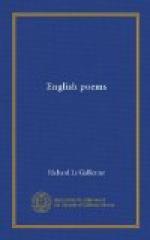Thou nightingale that for six hundred years
Sang to the world—O art thou husht at last!
For, not of thee this new voice in our ears,
Music of France that once was of the spheres;
And not of thee these strange green flowers that spring
From daisy roots and seemed to bear a sting.
Thou Helicon of numbers ‘undefiled,’
Forgive that ’neath the shadow of thy name,
England, I bring a song of little fame;
Not as one worthy but as loving thee,
Not as a singer, only as a child.
PAOLO AND FRANCESCA
To R.K. Leather (July 16th, 1892.)
PAOLO AND FRANCESCA
It happened in that great Italian land
Where every bosom heateth
with a star—
At Rimini, anigh that crumbling strand
The Adriatic filcheth near
and far—
In that same past where Dante’s
dream-days are,
That one Francesca gave her youthful gold
Unto an aged carle to bolt
and bar;
Though all the love which great young
hearts can hold,
How could she give that love unto a miser old?
Nay! but young Paolo was the happy lad,
A youth of dreaming eye yet
dauntless foot,
Who all Francesca’s wealth of loving
had;
One brave to scale a wall
and steal the fruit,
Nor fear because some dotard
owned the root;
Yea! one who wore his love like sword
on thigh
And kept not all his valour
for his lute;
One who could dare as well as sing
and sigh.
Ah! then were hearts to love, but they are long gone
by.
Ye lily-wives so happy in the nest,
Whose joy within the gates
of duty springs,
Blame not Love’s poor, who, if they
would be blest,
Must steal what comes to you
with marriage rings:
Ye pity the poor lark whose
scarce-tried wings
Faint in the net, while still the morning
air
With brown free throats of
all his brethren sings,
And can it be ye will not pity her,
Whose youth is as a lark all lost to singing there?
In opportunity of dear-bought joy
Rich were this twain, for
old Lanciotto, he
Who was her lord, was brother of her boy,
And in one home together dwelt
the three,
With brothers two beside;
and he and she
Sat at one board together, in one fane
Their voices rose upon one
hymn, ah me!
Beneath one roof each night their limbs
had lain,
As now in death they share the one eternal pain.
As much as common men can love a flower
Unto Lanciotto was Francesca
dear,
’Tis not on such Love wields his
jealous power;
And therefore Paolo moved
him not to fear,
Though he so green with youth
and he so sere.
Nor yet indeed was wrong, the hidden thing
Grew at each heart, unknown
of each, a year,—
Two eggs still silent in the nest through
spring,
May draws so near to June, and not yet time to sing!




